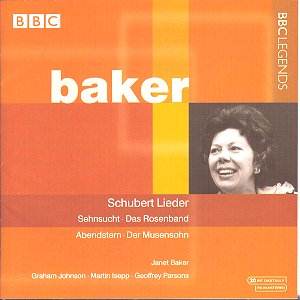  |
Franz SCHUBERT (1797-1828) Lieder: Die junge Nonne, D828 Das Rosenband, D280 Auf dem See, D543 Blumenlied, D431 Gondelfahrer, D808 Die Götter Griechenlands, D677 Der Jüngling und der Tod, D545 Schwestergruá, D762 Amalia, D195 Der Jüngling am Bache, D30 Entzückung an Laura, D390 Sehnsucht, D636 Der Sieg, D805 Abendstern, D806 Atys, D585 Augenlied, D297 Memnon, D541 Aufl"sung, D807 Der Musensohn, D764 Graham Johnson (piano) Nos. 1-6 Martin Isepp (piano), Nos.7-8 Geoffrey Parsons (piano), Nos. 9-19 Rec (Nos. 1-6): 2nd October 1977, The Maltings, Snape (Nos. 7-8): 20th April 1970, St John's Smith Square, London (Nos. 9-19): 1st September 1980, Usher Hall, Edinburgh |
| Crotchet AmazonUK AmazonUS Amazon recommendations | |
Janet Baker hardly needs a general introduction as a lieder singer. Her interpretations of Schubert are by now legendary, but these recordings from broadcast performances are not widely known. They are marvellous, and fully worthy of her name.
The programme is imaginatively compiled from three recitals across a period of ten years from 1970, and there are three different accompanists, each of whom is a major artist in his own right, particularly in this field.
The poets are varied, but three in particular are featured: Goethe, Schiller and Mayrhofer. Since Schubert excelled in his response to poetry, it is no surprise that each poet brings forth a different artistic personality from the composer, and Baker makes the most of this. For example, the dynamic nuances are quite wonderful, as in the real pianissimo effected in Entzückung an Laura, or the more dramatic approach in Sehnsucht. Die Götter Griechenlands is also splendidly done.
A few of the songs are perennial favourites, such as Der Musensohn, but there are plenty of others which are equally fine but hardly known.. Into this category come such as Auf dem See and Abendtern, and it is surely a tribute to the imagination of this compilation that it should explore the repertoire at the same time as paying homage to a great artist.
The recorded sound is good, not necessarily constant in acoustic or atmosphere, but never wanting in accuracy or pleasing tone. Each accompanist worked regularly with Janet Baker and enjoyed a special rapport with her.
The only disappointment has nothing directly to do with the performances, but concerns the general packaging. There is an interesting essay about Dame Janet, but practically nothing about the music she is performing. As if this is not bad enough, there are no texts and translations, so anyone wishing to make the most of these performances will need to have access to documentary material from some other source, such as John Reed's comprehensive study of the Schubert songs. But why should a major issue such as this fall victim to crass editorial decisions? Surely if recordings are to be issued, they should be issued properly. There really is no excuse.
Terry Barfoot